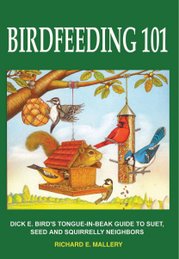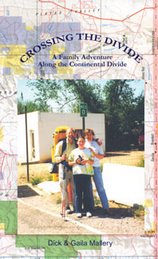
How old do you have to be to read The Dick E. Bird News?
Subscriber, Ruth Sheets, wrote that she was 92 and wondered who the oldest subscriber might be. I cannot accurately answer that question. Revealing your age is not a prerequisite of being a reader of The Dick E. Bird News. I do know that long time subscriber Ed Parker is in his late 90s, and I know of at least one other long time subscriber that is pushing 100. There is actually no age limitations for subscribers to this paper. It can be enjoyed by people of all ages. Some of you will read and learn about history in the paper and some of you made it.
Gaila told me to call a few suspects and ask. I might look stupid but I learned a long time ago never to ask age—especially a woman.
I never think of myself as old but I am often reminded by younger people. I was at the lumber yard one day buying a bunk of cedar to build bird feeders. A young man helped me load the truck. When I entered the contractor’s office to pay for my load I overheard another customer asking the young man if he had any cedar. His response was, “No, some old man just bought everything we had.” That reminded me of an old Jack Handey saying, “The face of a child can say it all, especially the mouth part of the face.”
Although I am noticing, now that I am an AARP member, that after a certain age the shyness to reveal age not only disappears—it completely reverses itself.
My late friend Gene Hegel used to send me all kinds of great stuff before he passed away. This is one I always enjoyed and seems to fit here:
When you’re a little kid, you’re so excited about getting older that you think in fractions. When children are asked how old they are, they respond, “I’m 6 and a half.” Nobody ever says “I’m 53 and a half.” The greatest day of your life is when you become 21. But you turn 30, and it makes you sound like bad milk. Then you’re pushing 40. It’s all slipping away. Then you reach 50.Next, you make it to 60. By then you’ve built up so much speed that you hit 70. After that, it’s day by day. You hit Wednesday. In your 80s, you hit lunch. In the 90s you start going backwards: “I was just 92.” Then, if you make it over 100, a strange thing happens. You become a kid again: “I’m 104, and a half.”
There are all kinds of old jokes—I mean old jokes about the old—and old depends on where you are thinking from. In the Marine Corps I remember a guy named Richard Herberger. He was drafted into the Marines (yes, during the Vietnam era the Marines did draft). He was 26 years old and the rest of us were 18. We called Herbie—“The Old Man.”
Here are a few descriptions of age:
• Middle age is when the narrow waist and broad mind begin to change places. —Auman
• As you age, you first forget names. Then you forget faces. Then you forget to pull your zipper up. Then you forget to pull your zipper down. —American Legion
• At my age the only thing I exercise is caution. —Harry Eberstadt
• Old age is when all the pills have extra strength, and you don’t.
On my first book tour I did a signing at a Barnes and Noble store in Seattle. They wanted me to do a talk that would attract children. Gaila and I were busy setting things up as a whole slew of kids began showing up. One little guy raised his hand before I even started talking. After a short introduction I knew I had better call on him before his arm flew off. When I called on him I was anticipating a bird question, but as Art Linkletter will tell you—never expect the obvious from children. In a quizzical voice the little boy said, “How come you’re so old and your wife is so young?”As his mother was dragging him away I yelled, “I think it has something to do with Miss Clairol.”
Personally, I don’t care if I look like Rip VanWinkle (or is it Van Wrinkle) as long as I can hike until well after Willard Scott is bragging about me. To answer the original question—if you are pushing 100 you are definitely in the top ten oldest subscribers to The Dick E. Bird News. I’m proud to have everyone of you regardless of age and would like to recruit about 10,000 more of you—so put the word out. --Keep Smilin', Dick E. Bird
Stealth Birdfeeding
As the sun rises over London’s Trafalgar Square, hundreds of pigeons huddle under Nelson’s Column in a scene reminiscent of Alfred Hitchcock’s "The Birds."
Thirty minutes later, a frenzy of cooing breaks out as a woman approaches wheeling a large suitcase. Inside Shelagh Moorhouse’s luggage is 15 pounds of corn. On opening it, she is engulfed by a swarm of flapping wings.
Moorhouse is one of a band of activists dedicated to saving the pigeons of Trafalgar Square. Mayor Ken Livingstone, who calls them "flying rats," has spent the past six years trying to banish the birds, saying they’re a health hazard and their droppings cost 140,000 pounds ($280,000) a year to clean up.
"We’ve got a despot with a pigeon phobia in charge of this city," says Moorhouse, 69, a retired radiographer. "It’s cruel and wrong to starve them just because one man doesn’t like them. You should be entitled to feed birds anywhere."
Since his election in 2000, Livingstone has pursued the pigeons with the same vigor he put into introducing a congestion charge to reduce traffic in the city center. He evicted the square’s bird-seed vendor, made pigeon-feeding a crime and deployed huge vacuum cleaners to suck up corn as part of an effort to beautify the square.
Where an estimated 35,000 pigeons once flocked, only about 1,000 now remain. Signs in half a dozen languages inform tourists of the bird-seed ban.











